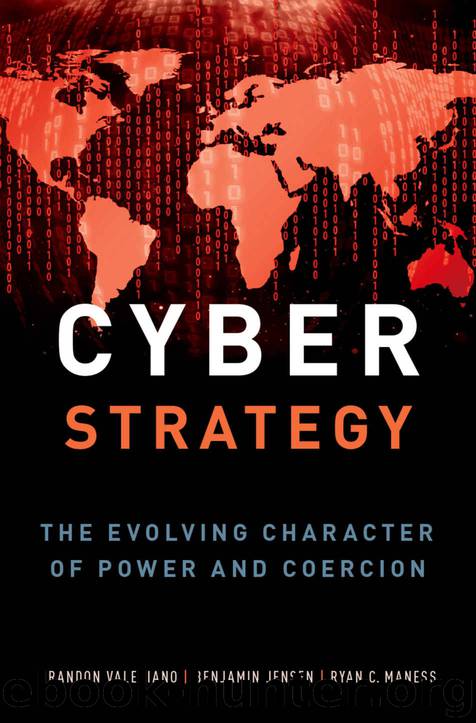Cyber Strategy: The Evolving Character of Power and Coercion by Brandon Valeriano & Benjamin Jensen & Ryan C. Maness

Author:Brandon Valeriano & Benjamin Jensen & Ryan C. Maness [Valeriano, Brandon]
Language: eng
Format: epub
Publisher: Oxford University Press
Published: 2018-04-16T21:00:00+00:00
THE EVOLUTION OF CHINESE STRATEGIC THEORY ON CYBERSPACE
To understand Chinese cyber activity, we also must understand the history of Chinese political thought around cyber coercion and the actual behavior evident in the data. We need to see the opportunities and risks inherent in the digital domain for a rising power like China. The possibilities offered by digital technology can be liberating (Livingston and Walter-Drop 2014). The connectivity of the modern world changes the character of strategic interactions (Khanna 2016) and enables China to focus on not just traditional military targets but also a broader range of social, political, and economic targets. Combining subjective and objective factors, psychological warfare, and cyber intrusions gives China a unique perspective as a cyber actor due to its targeted focus on seeking an information advantage after falling behind.
The December 2016 “Chinese National Cyberspace Security Strategy” is organized around three “grave threats”: political stability, economic progress, and culture solidarity (Creemers 2016). The strategy mentions that competition is expanding online, and that a small number of nations are aggravating a cyber arms race. The strategy develops a less aggressive face forward by noting, “We must persist in positive use, scientific development, management according to the law, and enhancing security, persist in safeguarding cybersecurity, use the development potential of cyber to the greatest extent, let it extend to China’s 1.3 billion people even better, enrich all of humankind, and persist in safeguarding global peace.”
Despite the recently developed national strategy for cyber security, actual cyber security doctrines developed by China differ vastly, with an obvious difference between declared intentions versus empirical realities evident in behavior. This is a typical challenge when evaluating the cyber security strategies of most states, and it is no different in China. Inkster (2015: 33) notes this duality of defensive strategy but overt offensive behavior. Pollpeter (2015: 139) describes an active policy of attacking first and offensively orientated strategies in Chinese doctrine despite the desire for defense strategies in communications with multinational players.
Active Chinese doctrine in cyberspace intrinsically links to information warfare doctrines. In fact, until the 2016 National Strategy, there was little to distinguish information warfare from cyber conflict in official doctrine because the terminology was different in China. Wang Pufeng, noted as the founding father of Chinese cyber security doctrine, writes, “information war is a product of the information age which to a great extent utilizes information technology and information ordnance in battle” (Foxman 2013).
This perspective evolved from earlier Chinese writings on information warfare that integrated classical and Communist strategic theory. In 1985, another noted earlier architect of Chinese cyber security policy, Shen Weiguang, proposed a new form of warfare, “take home battle,” in which networks across society mobilized to wage information warfare on behalf of the nation (Thomas 1998). The concept bridged Mao’s idea of People’s War with emerging capabilities.
A People’s War, best articulated in Mao Tse Tung’s (1967) On Protracted War, called for mobilizing popular support and waging a protracted guerrilla struggle before transitioning to conventional operations. With respect to information warfare, Shen Weiguang saw networks of citizens and businesses mobilizing in cyberspace.
Download
This site does not store any files on its server. We only index and link to content provided by other sites. Please contact the content providers to delete copyright contents if any and email us, we'll remove relevant links or contents immediately.
| Arms Control | Diplomacy |
| Security | Trades & Tariffs |
| Treaties | African |
| Asian | Australian & Oceanian |
| Canadian | Caribbean & Latin American |
| European | Middle Eastern |
| Russian & Former Soviet Union |
The Secret History by Donna Tartt(19052)
The Social Justice Warrior Handbook by Lisa De Pasquale(12187)
Thirteen Reasons Why by Jay Asher(8893)
This Is How You Lose Her by Junot Diaz(6877)
Weapons of Math Destruction by Cathy O'Neil(6264)
Zero to One by Peter Thiel(5786)
Beartown by Fredrik Backman(5737)
The Myth of the Strong Leader by Archie Brown(5499)
The Fire Next Time by James Baldwin(5431)
How Democracies Die by Steven Levitsky & Daniel Ziblatt(5215)
Promise Me, Dad by Joe Biden(5141)
Stone's Rules by Roger Stone(5081)
A Higher Loyalty: Truth, Lies, and Leadership by James Comey(4954)
100 Deadly Skills by Clint Emerson(4921)
Rise and Kill First by Ronen Bergman(4779)
Secrecy World by Jake Bernstein(4741)
The David Icke Guide to the Global Conspiracy (and how to end it) by David Icke(4705)
The Farm by Tom Rob Smith(4502)
The Doomsday Machine by Daniel Ellsberg(4484)
